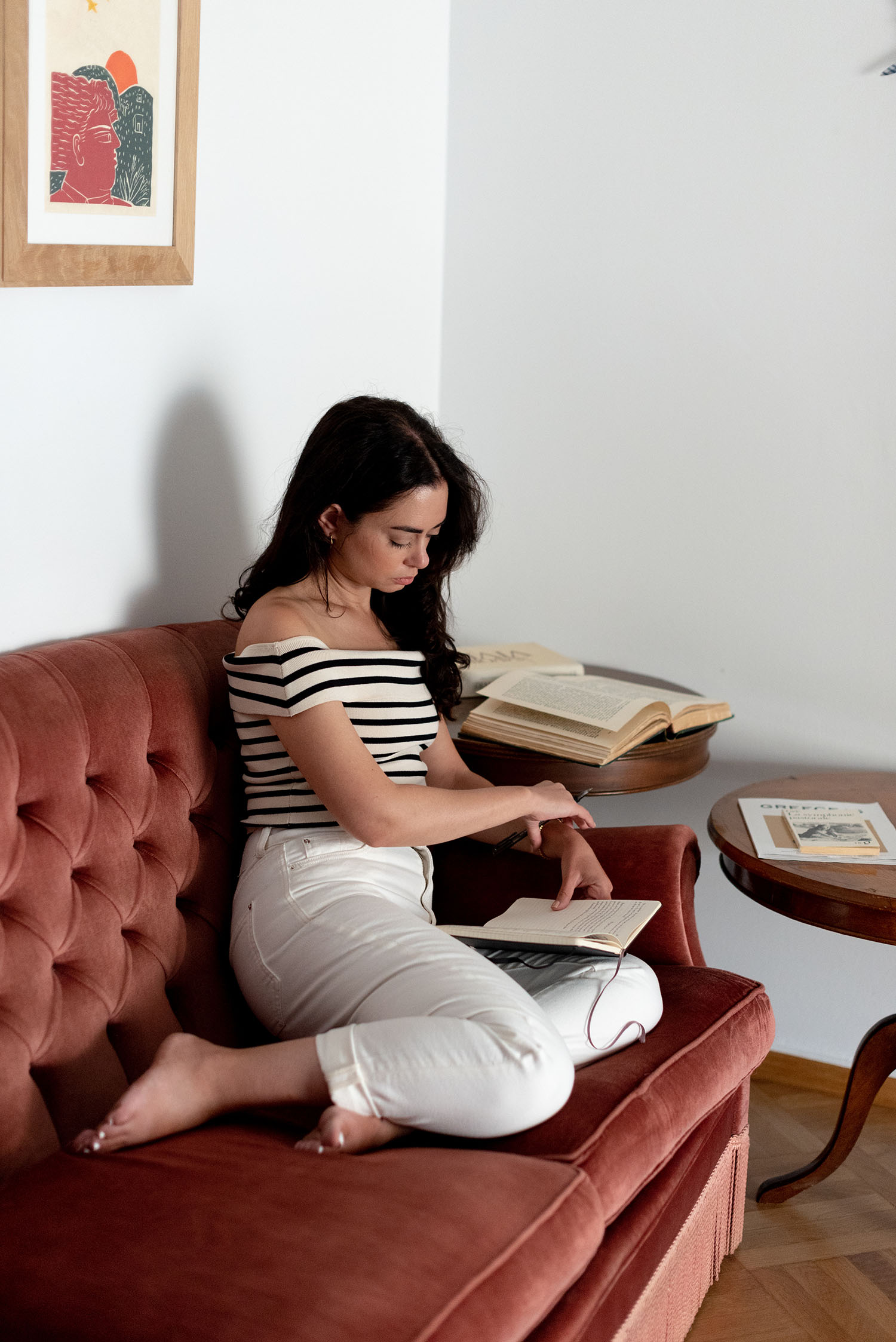
Zara jeans (similar)
Mejuri bracelet (similar)
Mejuri earrings (similar)
Location: Attiki – Athens, Greece
Journalling. There are Pinterest boards about it now. Everyone seems to have a little notebook they tote around or keep by their bedside. Writing is hugely important in helping us to both understand and express our feelings, so I get it. But watching this cultural shift is strange, as someone who kept a journal long before it was considered important or necessary. My parents gifted me my first journal for my ninth birthday. It was 1994. We were more inclined to call a little locked notebooks that a preteen girl scribbled in a diary, back then, than a journal. That’s certainly how I thought of that little notebook – as my diary. I didn’t realise I was at the start of something significant, when I wrote my first entry – that’s how it goes, a lot of the time.
I went on journalling for almost twenty years, until just after I got married and relocated to Vancouver for the second time. In those years, carrying a notebook everywhere you went set you apart as someone introspective, literary, and probably a bit odd. Since those adjectives all applied to me, anyway, I didn’t really mind.
It was when I was in my mid-twenties that I stopped journalling. It happened abruptly. I’d live through half a dozen life-altering events in a matter of months, including the break-up of my oldest friendship, my best friend coming out, a cross-country move, my wedding and an unexpected move into a job that filled me with self-loathing. The idea of taking a hard look at what I was afraid of, putting it on paper, which would effectively mean committing to it, was one I couldn’t stomach. And so, one afternoon, I closed my journal. I didn’t reopen it for the next six years.
I didn’t ever stop writing. That first journal from my parents was a catalyst, but I suspect I would have found my way to words in some other way if it hadn’t been for that. I wrote two novels, in those intervening years. But I put journalling aside, and left it there. Journalling meant confronting a series of uncomfortable truths that I wasn’t ready to face head on.
My first attempts at starting a new journal in my early thirties were half-hearted at best. Interestingly, it was another series of traumatic events, including one so notable that it made the news repeatedly for months, that made me feel compelled to start putting my thoughts down on paper again. But it was hard. I didn’t remember writing about myself as anything but a natural flow from brain to pen to paper, and yet there I was, struggling to get my words out. It took years of effort to truly get back to the habit of journalling again. It was through traveling, making notes on my experiences, that I finally got there.
Which left me questioning what might happen when 2020 arrived and life was we knew it was suspended. Would I keep up with my journal, when I had nothing to write about? When I look back now, the question seems almost comical. I filled an entire Moleskine notebook in the first year of the pandemic, and I’m a few pages from the end of a second one.
My approach to journalling is different from what it was when I was younger. I don’t record the events of each day for posterity, or use my pages to vent frustrations about the people in my life. If I’ve ever written a single word about work, I can’t remember it. I write to find out what’s on my mind – because sometimes, without writing, it’s hard to know. (I know how that sounds, but it’s true – sometimes, I write about things that were on my mind between 2010 and 2016, because if I don’t, they’ll just go on living in my head forever.)
The thing about journalling is that it can’t actually fix anything. That’s why I gave it up in 2010. You need to do that yourself and at the time, I just wasn’t ready. But you might not know what you need to fix or work on if you don’t write.
I’m STILL completely obsessed with this couch and your beautiful outfit. White jeans & stripes will always have my heart! As for journalling? Funnily enough, I used to be an avid journaler. However, in the last several years I’ve lost the motivation to be honest. But… I like your take on it now, and it’s making me wonder if it’s time I revisit journalling too. Happy Wednesday, my friend! Already making mental notes for our next chat in Jan. Lol! 😉